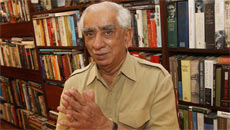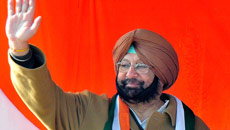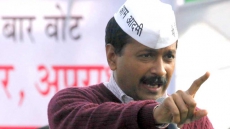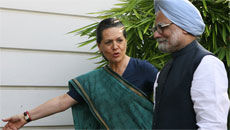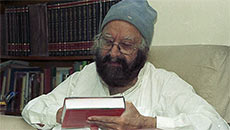Ofcourse there will be some sophistry by which the current scramble for Varanasi will be justified, but there are finer reasons for which the city should be more frequently remembered.
My earliest memories of Benaras go back to the 60s when my architect friend Satish Grover, a passionate student of history and an inveterate traveler, found us cheap accommodation on the ghats from where we watched the cycle of life and death as an early lesson in metaphysics.
On one side of the Ganga, young men grappled and exercised in "akharas" or mud pits, and on the other, funeral pyres burnt, starkly bringing about a closure on life’s narrative.
Rows of widows draped in white, shaven and austere, gazed vacantly, at the slow moving river. The contrast was provided by children jumping into it.
A priceless footage of musical history Doordarshan had once acquired shows Siddeshwari Devi and Rasoolan Bai on a barge, talking of “thumries”, the musical style famous in Varanasi. The understated words of the “thumrie”, its sensuous lyric, makes it sublime poetry. Take this example.
“Hiraye aanyeen kangana
Nadiya naarey.”
The meaning is straightforward: she lost her gold bangle near the river. The fact that the “kangana” was lost in a moment of orgasmic ecstasy is communicated, not in words, but by inflection of voice and tone.
We could hear the “thun-thun” of the tabla from the street at Kabir Chaura. Was it Shamta Prasad practicing? He was a genius, not so much for his mathematics as his ability to coax melody by sliding his left hand on the tabla.
Just as the old cities of Delhi and Lucknow have a decaying Urdu ambience to them, Gudaulia in Varanasi is primarily hindi with a purabia lilt. Men in white, starched kurtas and dhotis, amble towards their favourite paan shop, the city’s informal rendezvous.
All of this, minus the population density, must have enchanted Shaikh Ali Hazin, when he arrived here from Isfahan in 1750. He died here in 1766.
He recorded his “helplessness” in not being able to separate himself from Varanasi.
“Az Banaras na rawam
Maabad aam ast iinja
Har Barahman pisare
Lachmam o Ram ast iinja.”
(How can I ever leave Banaras. It is the Kaaba for all. Every Barahman here looks like the very son of Lakshman and Ram.)

Benaras cast a similar spell on Ghalib when he arrived here in 1828 on his way to Calcutta. It was here that he wrote his longest poem “Chiragh e Dair”, or Lamp of the Temple.
Banaras, he says, is like a beautiful woman
Who sees the changing phases of her face in the mirror
Of the Ganga.
“Ibaadat khanae naqoosian ast
hama na kaabae Hindustan ast”
(Here people make sacred music from conch shells.
This truly is the Kaaba of Hindustan.)
Varanasi had become an organic part of Persian and Urdu aesthetics much earlier. During this period Arabic remained the language of religious reform. This sometimes irritated poets like Yaas Yagana Changezi.
“Samajh mein kuch naheen aata,
Parhey jaaney se kya haasil?
Namazon mein hain kuch maani
To pardesi zuban kyon ho!”
(What is the point in saying your prayers five times a day? If your namaz is to have some meaning, why should it be in a foreign language?)
The ground for cultural commerce had been prepared by the great sufis. The ambience they left behind mingled in the regions with influences of Bhakti, the wandering mendicants and Faqirs. The great Nadaswaram player, Sheikh Chinna Maulana Sahib, or the Kathkali genius, Kalamandalm Hyderali in Tamil Nadu and Kerala and Qazi Nazrul Islam in Bengal have trodden the same spiritual path. In this journey they did not necessarily surrender their faith, only moderated it. With Ghalib, faith declined into agnosticism. Josh Malihabadi, Majaz, Faiz Ahmad Faiz were rank atheists.
Waris Shah of Dewa Sharif, Sufi shrine outside Lucknow had an exquisite reason for not saying his “namaz” or prayer. “Where is the space for me to go down in supplication?” In other words, “He is in me”. It reminds me of the title of Ramchandra Gandhi’s book, “I am Thou.”
Varanasi had also been woven into devotional Qawwalis. Mohsin Kakorvi, famous writer of naats or poetry dedicated to Prophet Mohammad, accentuated his devotion by retaining centers of Hindu pilgrimage as the backdrop. His description of the elements on receiving the news of the Prophet’s birth, is of breathtaking beauty:
“Samte Kashi se chala, jaanibe
Mathura Badal,
Taerta hai kabhi Ganga kabhi
Jamuna Badal…….”
(Clouds are travelling ecstatically from Kashi to Mathura. Sometimes they float above the Ganga, sometimes Jamuna.)
It is probably unfair to expect a hardened politician like Narendra Modi to see his constituency in this framework. But it would still be nice of Modi if he visited Bismillah Khan’s house at Chatta Tala in Beniabagh. Never was the Shehnai played with notes of such devotion at the Viswanath Temple; nor on Moharram when he walked bare feet, playing a dirge all the way to the river for the burial of the tazias.
On this note, may I offer Modi a grand bargain:

During the February 2002 Gujarat pogrom, rioters flattened a tomb not far from Ahmadabad’s main police station. It was the grave of Wali Dakhini (Gujarati). The candidate for Kashi should be astounded if he has a heart.
“Kooch ae yaar ain Kashi hai
Jogia dil wahan ka vaasi hai.”
(The lane where my beloved lives is like the holy city of Kashi. The Yogi of my heart has taken up residence there.)
If the goons desecrated Wali’s shrine in total ignorance, there is plenty of time before election day for Modi to restore the grave of this remarkable poet whose adoration for Indian civilization and Gujarat remains unmatched. But if it was done deliberately, in full knowledge, well, what can I say?
